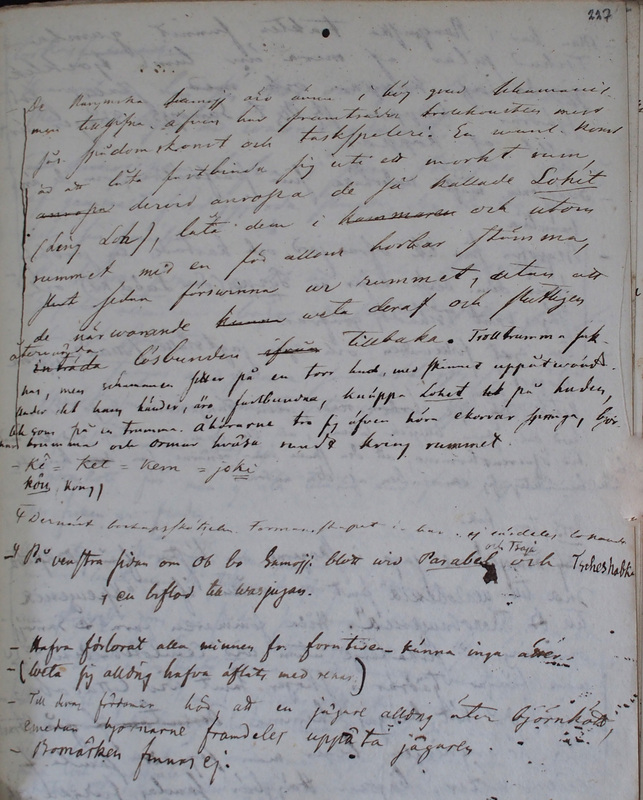Ethnographiska, historiska och statistiska anmärkningar. 227
Title
Ethnographiska, historiska och statistiska anmärkningar. 227
Description
| De Narymska Samojj.[Samojeder] äro ännu i hög grad
schamanismen
Castrén described Selkup shamanism and seances in more detail in Castrén 2019: 785–789. For recent research on the history of Selkup shamanism, see Prokof’eva 1949, 1961a, 1961b, 1981.
tillgifna äfven här framträder trollkonsten mest sås[om]. spådomskonst och taskspeleri. En wanl[ig]. konst är att låta fastbinda sig uti ett mörkt rum, anropa dervid anropa de så kallade Lohit (Ling Loh) låta dem i kammaren och utom rummet med en för allm[än] hörbar stämma,
For the soundscape, see Kim-Malon 2021: 30.
slut sedan försvinna ur rummet, utan att de närwarande kunna weta deraf och slutligen återvända lösbunden ifrän tillbaka. Trolltrumma sak- nas, men schamanen sitter på en torr hud, med skinnet uppåtwändt. Under det hans händer, äro fastbundna, knäppa Lohet
på huden,SE loh ʻspirit’. See sgr.fi/manuscripta/vocabulary. A general name for spirits. See [MC Ostiak-Samoiedica’s vocabulary] (Selkup mythology 2010: 148–150).
liksom på en trumma. Åhörarna tro sig äfven höra ekorrar springa, björ- nar brumma och ormar hväsa rundt kring rummet. Kî=Ket=Kem=joki Köu (köng) <Dernäst boskapsskötseln. Formansskapat i har ej särdeles lokande> På venstra sidan om Ob bo Samojj.[Samojeder] blott wid Parabel
och
The River Parabel’ flows into the Obʹ. GVR
Tsaja
och
The River Čaja flows into the Obʹ. GVR
Tscheshabka,
The River Čižapka flows into the River Vasjugan. GVR
en biflod till Wasjugan. Hafva förlorat alla minnen fr[ån]. forntiden, känna inga ätter (Weta sig alldrig hafva äflats med renar.) Till deras fördomar hör, att en jägare alldrig äter björnkött, emedan björnarne framdeles uppäta jägaren. Bomärken finnas ej. |
The Narym Samoyeds are still highly devoted to shamanism; here witchcraft also exists, mainly as divination and conjuring tricks. A common trick is to be tied up in a dark room, and call the so-called Lohit (Ling Loh), let them in and then out the room with an overly audible voice then end up disappearing from the room without those present knowing about it, and finally returning untied. There are no drums, but the shaman sits on a dry skin, with the skin facing up. Under the skin his tied hands are ticking Lohet’s skin, like a drum. The audience also thinks they hear squirrels running, bears growling, and snakes hissing around the room.
Kî = Ket = Kem = joki Köu (köng) On the left bank of the Ob, the Samoyeds live only by the Parabel and the Tsoja and the Tscheshabka, a tributary of the Wasjugan.They have lost all memories of antiquity and know no clans. (They know that have never worked with reindeer.) One of their prejudices is that a hunter never eats bear meat, because the bears would later eat the hunter. There are no house marks. |

